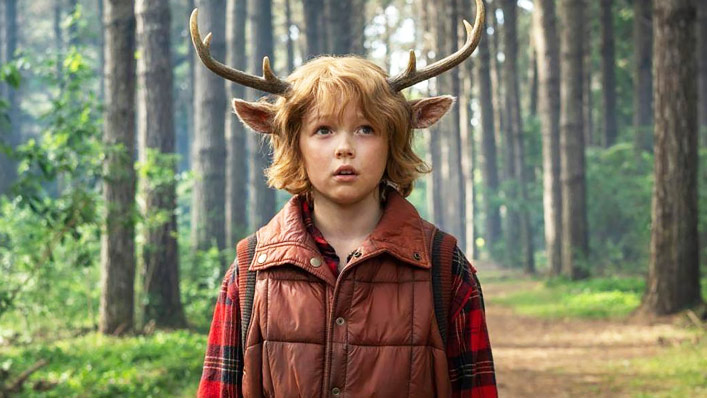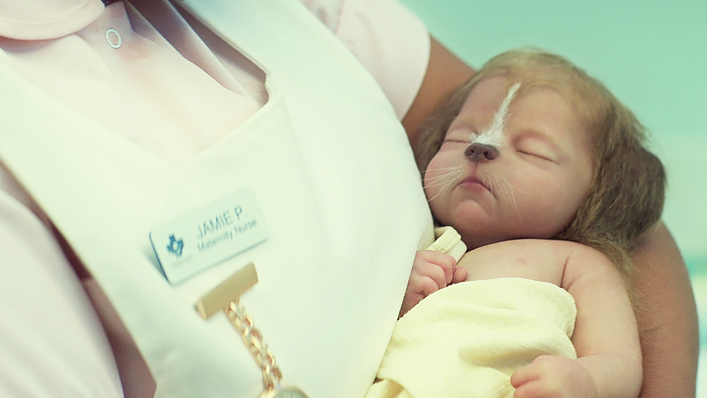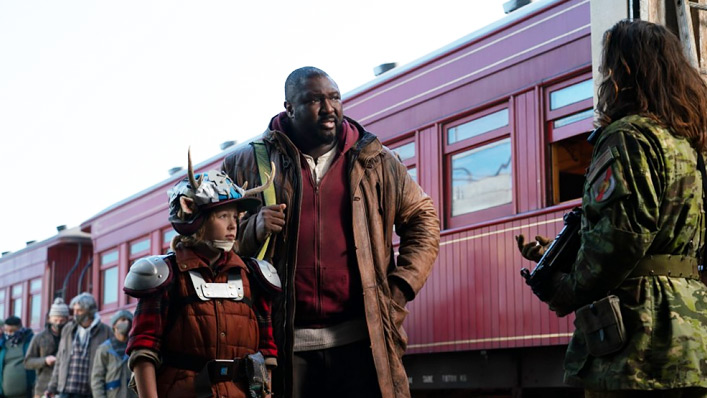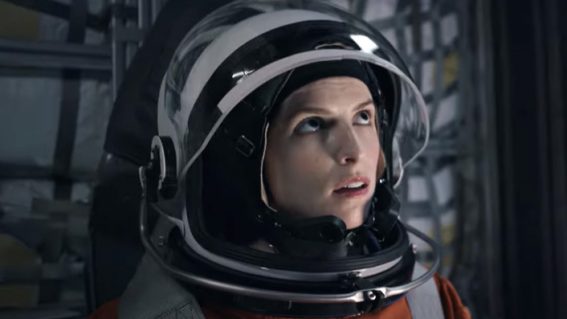Aotearoa-shot Netflix series Sweet Tooth is a beautiful apocalyptic fantasy
It’s got a pandemic – and at the same time, it’s pretty bloody cute.

Netflix’s engrossing new series (arriving on June 4) is based in an apocalyptic future with cute human/animal hybrids. It’s full of grand adventure and video game-esque worldbuilding, writes critic Luke Buckmaster.
“As the world slipped into chaos, something else was happening, something extraordinary,” says James Brolin’s narrator in Sweet Tooth, his irresistible wholesome-voiced inflection like a beautiful piece of antique wood that has somehow learned how to speak. These early words in creator Jim Mickle’s very engaging adaptation of Jeff Lemire’s comic book—rendered in big, juicy, creamy colours, and conjuring a grand sense of adventure—allude to two dichotomous pillars of Netflix’s new series.
See also:
* Best new movies and shows on Netflix
* All new movies & shows on Netflix
The chaos and grimness of the apocalypse on one hand; extraordinarily cute things on the other. The latter, known as “hybrids”, are humans born with the DNA of animals, resulting in adorable looking characters such as deer-boy protagonist Gus (Christian Convery). Given the birth of these people/animals/planimals occurred at the same time as a spread of a deadly new virus, which triggered an apocalypse assigned the name of a delicious-sounding dessert (“The Great Crumble”), hysterical people welcome the hybrids with the sageness of a pitchfork-waving crowd.

Cute lil Gus becomes—like Paddington, the X-Men mutants and many others before him—part of ‘the other’, with all the real world baggage (i.e. xenophobia and racism) this otherness allegorically implies. An idea toyed with throughout the series is a long-overrun natural world is reclaiming space occupied by humans, a theme even explored in the protagonist’s own body. This is visually represented in shots reminiscent of other pandemic-themed productions—Terry Gilliam’s feature film Twelve Monkeys, for instance, and the video game The Last of Us.
There is a real-world connection here, sort of. With the pandemic still raging, renewed concern exists about animal and human worlds being too closely linked; in a sense however Sweet Tooth goes the other way, inferring that a fusion of human and animal may be opportunity for rebirth. Although the hybrids appear to be directly connected to the dawn of the great delicious dessert dystopia, it’s not their fault. The circumstances around their arrival exacerbate their otherness—relating not just to how they look but their emergence during a time of social and political upheaval.
It begins in fairytale mode, with visions of lush green wilderness and amazing new creatures paired with the woody lilt and wisdom of that bedtime narrator, who reminded me of Sam Elliott from The Big Lebowski (“There’s this fella I wanna tell ya about, fella by the name of Jeff Lebowski”). The first episode shows Gus and his father (Will Forte) absconding to the wilderness, the old man embracing the Shaun of the Dead approach to the apocalypse: “let’s just have a nice cold pint and wait for all this to blow over.”
In their rustic home in Nowheresville dad tells his son never to cross the fence—which of course marks it as a geographic and narrative threshold certain to be crossed. At this point we don’t have a clear sense of what has become of society, so we kind of want to cross that line ourselves, encouraged by the narrator’s tantalisingly vague commentary that alludes to a society gone or going to the dogs (“once the internet went down it was over…”) .
Among the other key characters, looking very worried and bothered for most of the time, is doctor Aditya Singh (Adeel Akhtar), who lives with his wife in a neighbourhood where the community pretends to be normal. Or rather exists in the “new normal,” as it were, which involves wrapping infected people in plastic then burning them alive. Bad Boy Bubby would fit right in.

To put it another way: the adorable animal children, with their adorable antlers and their adorable bunny ears and so forth, live in a world with very…not adorable things. These can be periodically rolled out to ratchet up the tension. There is the addition of a really, really cute character later on, connected to an underdeveloped (though this didn’t really bother me) plotline involving a woman (Dania Ramirez) who has turned an abandoned zoo into a refuge for hybrids. This crosses the line—very briefly, thankfully—into extreme, plush toy-looking cutesiness, bringing to my mind acid flashbacks of the Porgs from Star Wars.
But there is no doubt Sweet Tooth ventures to dark places; it needs to in order to offset elements that might have come across as twee in lesser hands. For instance: that nourishing narrator; the many handsome images of misty evenings, star-filled skies and scenes shot at dusk; and a central, surprisingly affecting odd couple relationship between Gus and a hulking vagabond named Jepperd aka ‘Big Man’ (Nonso Anozie).
Like the best family productions, Sweet Tooth evokes the child in the adult and the adult in the child, not pandering to youngsters with empty gestures nor implying crusty oldies cannot be filled with wonder. Despite the characters being far from engaging or complex (little Gus is a blank canvas onto which others project themselves) I always looked forward to returning to them, and in particular to the universe they inhabit, fleshed out in a spirit of worldbuilding reminiscent of large sprawling video game. Part of Sweet Tooth’s appeal is tonal: despite being based in an apocalypse, it puts you in a pleasant space.























